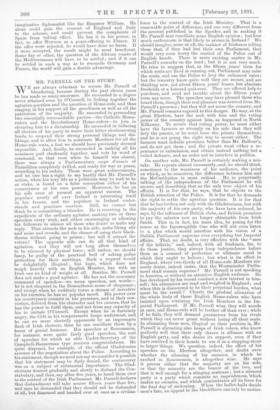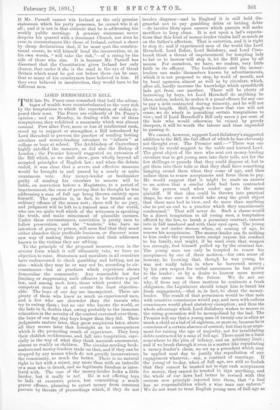MR. PARNELL ON THE STUMP.
WE are always reluctant to accuse Mr. Parnell of blundering, because during the past eleven years he has made so many successes. He succeeded to a degree never attained even by O'Connell, in linking together the agrarian question and the question of Home-rule, and thus i ranging n his support all the greediness as well as all the patriotism of the majority. He succeeded in persuading two essentially irreconcilable parties—the Catholic Home- rulers and the Revolutionary Home-rulers—to join in elevating him to a dictatorship. He succeeded in inducing all electors of his party to waive their bitter electioneering feuds, to suspend their strong personal likings and dis- likings, and to allow him to nominate Members for all the Home-rule seats, a feat we should have previously deemed impossible. And, finally, he succeeded in making all his nominees pull obediently together, and vote by word of command, so that even when be himself was absent, there was always a Parliamentary corps d'armje of Parnellites completely drilled, and ready for war or peace, according to his orders. Those were great achievements, and no one has a right to say hastily that Mr. Parnell's action, when his very life as a politician may be said to be at stake, is based on a false conception either of his countrymen or his own powers. Moreover, he has on his side even at present an apparent success. The populace nearly all over Ireland is interesting itself in his favour, and the populace in Ireland under- stands and practises coercion. Still, we cannot but think he is committing a blunder. He is resorting to the expedients of the ordinary agitator, making two or three speeches every week, and either encouraging or allowing his followers to silence all those who desire to make any reply. That attracts the mob to his side, mobs liking stir and noise and crowds, and the chance of using their black- thorns without going to prison ; but will it attract the voters ? The opposite side can do all that kind of agitation, and they will not long allow themselves to be silenced by physical force ; will rather, we should fancy, be guilty of the practical bull of asking police protection for their meetings. Such a request would be delightfully illogical ; but logic, which does not weigh heavily with an English Member, has with an Irish one no kind of weight at all. Besides, Mr. Parnell does not make a good agitator. He has not the necessary command of speeches—we mean speeches, not words— he is not eloquent in the Demosthenic sense of eloquence ; and except when he suddenly turns a stream of invective on his enemies, he has no popular mood. His power over his countrymen consists in his promises, and in their con- viction, derived from his character and his success, that he has the power to fulfil them, and not from any capacity of i his to imitate O'Connell. Except when he s furiously angry, the Celt in his temperament keeps undermost, and he can no more electrify opponents by an impromptu flash of Irish rhetoric, than he can conciliate them by a burst of genial humour. His speeches at Roscommon, for instance, were quite fairly good speeches, the sort of speeches for which an able Under-Secretary of the Campbell-Bannerman type receives congratulations. He quite disposed, for example, of the official Gladstonian account of the negotiation about the Police. According to his statement, though we need not say we consider it possible that his statement may be flatly denied, the controversy was on a subject of substantial importance. The Glad.- stonians desired gradually and slowly to disband the Con- stabulary, and then, say after five years, to hand them over to the control of the Irish Parliament. Mr. Parnell declares that disbandment will take nearer fifteen years than five, and says he demanded that they should not be disbanded at all, but disarmed and handed over at once as a civilian force to the control of the Irish Ministry. That is a reasonable point of difference, and one very different from the account published in the Speaker, and in making it Mr. Parnell may conciliate some English opinion ; but how much enthusiasm is that likely to arouse in Ireland ? We should imagine, none at all, the instinct of Irishmen telling them that, if they had but their own Parliament, they would very soon worry the control of the Police out of English hands. There is more exciting matter in Mr. Parnell's remarks on the land ; but it is not very much. He tries to suggest that, as the fifteen years' term for which rents are fixed is running out, Parliament may raise the rents, and use the Police to levy the enhanced rates ; but the tenantry know quite well they are secure, and are thinking now, not about fifteen years' leases, but absolute freeholds at a lowered quit-rent. They are offered help to purchase, and need not trouble about the fifteen years' term any more. The speeches may have pleased those who heard them, though their real pleasure was derived from Mr. Parnell's presence ; but they will not rouse the country, and Mr. Parnell remains exposed to this danger. He may, at the great Election, have the mob with him and the voting power of the country against him, as happened in North Kilkenny. To secure that voting power, he must either have the farmers so strongly on his side that they will defy the priests, or he must have the priests themselves; and he is not going the right way to secure either. The farmers want definite promises better than Mr. Balfour's, and do not get them ; and the priests want either a re- pentance or submission, and obtain instead nothing but a veiled defiance, and an order not to interfere in politics.
On another side, Mr. Parnell is certainly making a mis- take. He repeats almost incessantly, and, we should think, sometimes to the weariness of his audience, the point on which, as he conceives, the difference between him and the McCarthyites is most radical. He is perpetually talking of the independence of. the Parliament he will secure, and describing that as the only true object of his efforts. It is for that, he says, that he objects to the British retention of the Police. It is for that he demands the right to settle the agrarian question. It is for that that he has broken not only with the Gladstonians, but with the majority of his own party, who have been seduced, he says, by the influence of British clubs, and British promises to pay the salaries now no longer obtainable from Irish funds. This is, in fact, his main idea, he posing for the nonce as the Incorruptible One who will not even listen to a plan which would interfere with his vision of a Dublin Parliament supreme over everything but Imperial affairs. That, no doubt, is very effective with the "men of the hillside," and, indeed, with all Irishmen, for, to do them justice, they always keep independence before them as a counsel of perfection or ultimate creed in which they ought to believe ; but what is its effect in England, where two-thirds of all Home-rule Members sin- cerely desire, indeed insist, that the Westminster Parlia- ment shall remain supreme ? Mr. Parnell is not speaking in America, or without an attentive English audience. He has developed by his recent conducta new interest in him- self ; his utterances are read and weighed in England; and when this is discovered to be their perpetual burden, what must be the result ? Clearly the gradual alienation of the whole body of those English Home-rulers who have insisted upon retaining the Irish Members in the Im- perial Parliament. If Mr. Parnell wins, they will secede at once, and Home-rule will be farther off than ever ; while if he fails, they will demand guarantees from his rivals which they can never grant without losing all their seats. In alienating these men, illogical as their position is, Mr. Parnell is alienating also heaps of Irish voters, who know perfectly well that their only chance is alliance with an English party, and who desire its support, even if they have resolved in their hearts to use it as a stepping-stone to larger things. We question, indeed, the effect of his speeches on the Election altogether, and doubt even whether the silencing of his enemies, in which he exulted in Roscommon, is altogether wise. He says it proves either that the majority are on his side, or that the minority are the braver of the two. , and that is well enough for a stinging sentence ; but a silenced party is a party which commits no imprudences, which makes no enemies, and which concentrates all its force for the final day* of reckoning. When the ballot-balls decide men's fate, an appeal to the blackthorn can only be unwise. If Mr. Parnell cannot win Ireland as the only genuine statesman which his party possesses, he cannot win it at all ; and it is not in that attitude that he is addressing his weekly public meetings. A genuine statesman never deepens his quarrel with a dominant Church, nor does he ever, in circumstances like those of Ireland, extract a cheer by cheap declarations that, if he must quit the constitu- tional course, he will himself head the insurrection, or, in his own words, " will take the risk,"—of a rising by the side of those who rise. It is because Mr. Parnell has discerned that the Constitution gives Ireland her only chance, that under it she is the sand in the eye of Great Britain which must be got out before there can be ease, that so many of his countrymen have believed in him. If they ever believed in insurrection, they would turn to far different men.







































 Previous page
Previous page